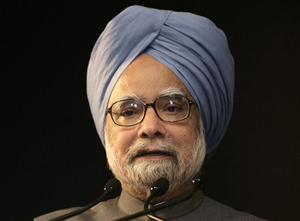 New Delhi, Dec 5: No business could be transacted on the first day of Parliament's Winter Session, which began on Thursday, as the Opposition strongly opposed the Centre's move to bring the Anti-Communal Violence Bill among other important legislations.
New Delhi, Dec 5: No business could be transacted on the first day of Parliament's Winter Session, which began on Thursday, as the Opposition strongly opposed the Centre's move to bring the Anti-Communal Violence Bill among other important legislations.
According to reports, both houses of Parliament were adjourned for the day after obituary references.
Minutes ahead of the commencement of the Winter Session, the Prime Minister, Dr Manmohan Singh, made an appeal to all political parties to ensure the smooth functioning of Parliament and sought to evolve a broad consensus on all important matters.
Expecting fireworks during the Winter Session, the Prime Minister said, "Government will try to arrive at a consensus and seek support of all parties on all controversial issues."
Responding to objections raised by several chief ministers, including Narendra Modi, to the proposed Anti-Communal Violence Bill, Dr Singh said, "It will be our effort to evolve a broad based consensus on Anti-Communal Violence, Women's Reservation and other important Bills.”
Seeking the cooperation of the opposition parties in ensuring the smooth functioning of Parliament, the PM said, "This session of Parliament is of short duration hence it is obligatory on all parties to get essential business transacted as speedily and smoothly as possible."
The appeal from the PM came shortly after various political parties condemned the move to introduce the Anti-Communal Violence Bill in this session.
Reacting to it, KC Tyagi of the JD (U) said, "In the name of this Bill (Communal Violence) Narendra Modi is doing politics."
BJP leader Murli Manohar Joshi also reacted by saying, "The Communal Violence Bill is highly divisive in itself."
"This is not Communal Violence Bill, this is Communal Vote Bill, " Mukhtar Abbas Naqvi of BJP said.
While BSP chief Mayawati opposed the high amount of control the Communal Violence Bill gives to the Centre, D Raja of the Left said that changes must be made to the bill.
"First a consensus on Communal Violence Bill must be made and then it should be brought in Parliament," Mayawati said.
However, Union Home Minister Sushilkumar Shinde said that the Communal Violence Bill will definitely be passed in this session.
Bringing the issue back in spotlight, BJP's PM candidate Narendra Modi wrote a letter to the Prime Minister and raised objections to the controversial bill.
The Winter Session of Parliament is likely to be a stormy one with Centre aiming to push several controversial bills and the Opposition all set to attack it on a number of issues.
The tone of the Winter Session will also depend on the outcome of Assembly polls in five states, especially as the exit polls have suggested huge losses for the ruling Congress in major states.
The UPA government has listed a number of important bills, including Anti-Communal Violence Bill and Women's Reservation Bill etc, while the Opposition, which is demanding extension of the 12-day sitting, is likely to press for introducing the Telangana Bill.
The Centre is expected to face Opposition heat over bills like the Lokpal Bill and Women's Reservation Bill which have been passed by one House and now await the other House's nod.
A bill on the creation of the new Telangana state does not figure in the government's agenda but the BJP is adamant that the process for the same should be set in motion immediately.
As per the Anti-Communal Violence Bill is concerned, the Centre wants to bring an amended version, but it has been opposed by several states and the Opposition, which sees it as an attempt to infringe on the Constitutional rights of a state.
The UPA, which has faced criticism over allegations of corruption, for failing to control inflation and its handling of the overall economy, will certainly try to make an attempt to win back some lost ground by putting up key Bills for debate.
The BJP has also sought a discussion on internal security with a special focus on the 27 October blasts in Patna ahead of a rally in the city addressed by its prime ministerial candidate Narendra Modi.
The main opposition party has a wide range of controversial issues on which it will challenge the government, including a move to bring in a controversial communal violence Bill, alleged misuse of the Central Bureau of Investigation (CBI) and the functioning of the Joint Parliamentary Committee that probed irregularities in the allocation of second-generation telecom spectrum.
At Tuesday’s all-party meeting, the Samajwadi Party threatened to disrupt proceedings if the Women’s Reservation Bill and legislation seeking to carve out a quota in job promotions for scheduled castes and scheduled tribes are taken up.
The BJP and Asom Gana Parishad strongly opposed any plans to introduce a constitutional amendment Bill on the India-Bangladesh Land Boundary Agreement; the Bill is listed in the legislative agenda.
Left parties are seeking a detailed debate on the communal riots that killed more than 62 people and displaced thousands in Uttar Pradesh’s Muzaffarnagar district in August-September.
The government has also listed one of its major reform initiatives, the Direct Taxes Code Bill, in the legislative agenda as well as an education tribunal Bill that aims to create a quasi-judicial body to fast-track resolution of conflicts in the education sector, and the proposed whistle blowers protection law.
The government's arsenal seems restricted to countering the BJP on the Gujarat snooping scandal, targeting its prime ministerial candidate Narendra Modi.





Comments
Add new comment